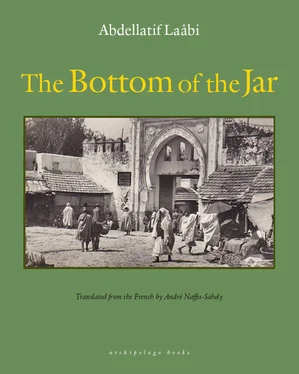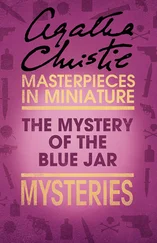Stila ntila
A little leaky bucket
T-qtar b-el-ma l-khdar
Spills its greenish water
Jani jitou
It comes and goes
Taq fech
Bang pffft
Fik el-ach
Dwells in you.
While aware the situation was clear, Namouss was nonetheless determined to exculpate himself and innocently said, “It wasn’t me, it was Abdelwahab who farted.”
“Shut your trap,” Driss barked, anxious to show the coachman that he’d raised his children to be well-mannered. But Ghita, who didn’t give a fig for social conventions, started giggling, her laughter spreading through the rest of the family — even Driss’s shaggy mustache began to twitch.
Reaching the halfway point in the journey, a place called Safsaf (the Poplars), the coachman decided to stop to allow the horse a moment to catch its breath and the family an opportunity to stretch their legs. Sensing that the fresh air had whetted the rascals’ appetites, Ghita laid out an impromptu picnic. She spread a blanket in the shade of a poplar tree and brought out the provisions: a chicken she had roasted in the wee hours before dawn, some bread, as well as some oranges, which she carefully peeled and placed on a napkin. A portion was set aside for the coachman, who had gone to sit at a distance from the family and had turned his back to them. Following suit, Ghita too had turned her back to the road and quickly removed her veil so as to be able to snack unencumbered. This made Namouss uncomfortable, as it was the first time he had seen his mother uncovered in public. Whenever he had accompanied her to the shrine of Moulay Idriss, where she would drink from the blessed fountain of Bab Loufa, she had restricted herself to lifting her veil slightly so as to bring the tumbler of water to her lips. She had never lowered the veil, not even past her nose. Namouss’s eyes drifted to Driss, whom he thought would surely react to this fdheha , this scandal. But his father seemed not to have noticed or — could it be? — wasn’t offended by what had happened. Driven by the morals that had been instilled in him, which demanded that men must guard the honor of their womenfolk at all times, Namouss thought it only right to remind his mother of the rules of polite society. Getting on his high horse, he told Ghita: “We are outdoors, Lalla, cover your face.”
Rather amused by his remark, Ghita quipped, “What are you, my husband? Go blow a snot rocket! That’s all I need — a boy the size of a chickpea telling me what to do!”
And in a gesture of defiance, she pulled down the hood of her djellaba and bared her head, which was now utterly naked without the scarf to hide her hair.
“Go ahead and die of shame,” she went on, “and if you keep pushing your luck, I’m more than ready to give you another earful.”
Driss followed the scene, embarrassed. Wanting above all to prevent a further escalation, the only solution left to him was to hasten the departure.
“Stop this pointless chatter,” he said. “We still have a long journey ahead of us.”
SIDI HARAZEM CAME into view: a verdant oasis in a ravine surrounded by barren hills.
The lodgings Driss had rented amounted to a large room with pink adobe walls. The beaten earth floor was covered in mats. There was no kitchen, let alone bathrooms. But no one complained, not even Ghita, who was already busying herself unpacking and putting the place to right.
“Don’t just stand around and get in my way while I’m trying to work,” she said to the children. “Go and have a wash.”
The children followed her instructions to the letter. They split into two groups according to gender and went on their way.
Namouss followed his brothers, who knew their way around the village. They stopped in front of the first public fountain, which was called Nakhla (the palm tree). Teeming with people, it was absolute bedlam, with everyone jostling and frolicking about. A few divers, or divers of sorts, were hanging from the branches of a slender palm tree overlooking the pool. From time to time, one of these daredevils would all of a sudden drop from the tree into a group of unsuspecting bathers below, where they were greeted by a flood of insults, often with a firm slap to the head mixed in for good measure. To calm things down, some wise bystanders began to sing a hymn in praise of the Prophet, with the rest of the swimmers joining in: “Blessings upon him, Oh emissary of God. .”
Namouss was dragged away from the scene by his brothers, who explained that there was another, more peaceful fountain called El-Ariane (the exposed one). On the way, they showed him the entrance to another fountain called Qobba (the dome), which the adults had decided to set aside for their own exclusive use to escape the frenzy of the young. Namouss asked about the fountain reserved for women but was only provided with a vague indication. He was soon to discover that it was located right next to the El-Ariane fountain, and that ruffians would gather to peep at the female bathers through a mysterious — or crafted? — crack in the wall.
Several merchants had erected tents inside their simple reed noualas on the perimeter of the El-Ariane pool, where they sold everything from peanuts to sweets, chewing gum, and bottles of lemonade, as well as spices, charcoal, and gas lanterns. Among those huts, they searched for the bathing-suit lender, since while all his older brothers had suits, Namouss didn’t because it was the first time he’d gone swimming. All the suits were enormous. The smallest one they managed to find was a dreadful pair of coarse woolen pants. Namouss was forced to put them on, despite his protests. They were so large they hung down to his knees and caused serious itching in his private parts. But the chance to swim was now at hand, and the disconsolate boy forgot all his troubles as soon as he hit the tepid water. Namouss found the water so delightful he was loath to leave it when his brothers decided it was time to go. Hunger had begun to gnaw at them.
Return to the “house.” Ghita was in a good mood. May it last! The smell emanating from the pot cooking on top of the brazier made everyone’s mouth water. Driss was there, stretched out on a mattress, eyes open, in seventh heaven. Namouss was taken aback by this newfound sense of peace, this harmony. He went to snuggle up against his mother, who stroked his hair before saying, “Your mop-top’s grown. You look like an ogre. It’s time to get it cut. Aha! You’ve got some color in your cheeks already! In just a few days you’ll go from being white as an egg to a black bernata , like a Negro.”
Knowing Ghita’s sense of humor, Namouss takes that statement for what it is, a burst of affection.
The girls had also come back. Ghita, still wrapped up in Namouss, now asked him to let go of her knees.
“All right, that’s enough snuggling now. It’s time I looked after your bellies.”
Lunch was served. Everyone huddled around the communal plate and ate, as usual, in silence. Ghita contented herself with dipping her bread in the sauce and having some vegetables. She pushed the few bits of meat from her side of the plate toward Driss or one of the children but was always careful never to eat more than her fair portion. They licked the tagine until it shone.
“There should never be any leftovers after you’ve eaten” was Driss’s motto.
After the siesta, it was time for new adventures. Namouss followed after his brothers, who were proposing all sorts of discoveries. This time the objective was a vast meadow at the foot of the village. Once they’d arrived, Namouss thought he was back on the school playground, except that this time it was the grown-ups who had the run of the place. They had broken off into groups, each of which was devoted to a specific activity and seemed unaware of the existence of the others. One group, led by a Mr. Muscles in sportswear, was doing gymnastics. Another was playing soccer. While the third was busy playing a game Namouss had thought was reserved for children: leapfrog. And in the middle of all this bustle, a group of impassive cardplayers, who carried on with their game using a Spanish deck.
Читать дальше












